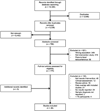Emerging mHealth and eHealth interventions for serious mental illness: a review of the literature
- PMID: 26017625
- PMCID: PMC4924808
- DOI: 10.3109/09638237.2015.1019054
Emerging mHealth and eHealth interventions for serious mental illness: a review of the literature
Abstract
Background: Serious mental illness (SMI) is one of the leading causes of disability worldwide. Emerging mobile health (mHealth) and eHealth interventions may afford opportunities for reaching this at-risk group.
Aim: To review the evidence on using emerging mHealth and eHealth technologies among people with SMI.
Methods: We searched MEDLINE, PsychINFO, CINAHL, Scopus, Cochrane Central, and Web of Science through July 2014. Only studies which reported outcomes for mHealth or eHealth interventions, defined as remotely delivered using mobile, online, or other devices, _targeting people with schizophrenia, schizoaffective disorder, or bipolar disorder, were included.
Results: Forty-six studies spanning 12 countries were included. Interventions were grouped into four categories: (1) illness self-management and relapse prevention; (2) promoting adherence to medications and/or treatment; (3) psychoeducation, supporting recovery, and promoting health and wellness; and (4) symptom monitoring. The interventions were consistently found to be highly feasible and acceptable, though clinical outcomes were variable but offered insight regarding potential effectiveness.
Conclusions: Our findings confirm the feasibility and acceptability of emerging mHealth and eHealth interventions among people with SMI; however, it is not possible to draw conclusions regarding effectiveness. Further rigorous investigation is warranted to establish effectiveness and cost benefit in this population.
Keywords: eHealth; mHealth; mental health; mobile health; remote technology; serious mental illness.
Similar articles
-
Acceptability of Interventions Delivered Online and Through Mobile Phones for People Who Experience Severe Mental Health Problems: A Systematic Review.J Med Internet Res. 2016 May 31;18(5):e121. doi: 10.2196/jmir.5250. J Med Internet Res. 2016. PMID: 27245693 Free PMC article. Review.
-
Comparing a Smartphone Program with a Peer-Led Program to Help People with Serious Mental Illness Manage Their Symptoms [Internet].Washington (DC): Patient-Centered Outcomes Research Institute (PCORI); 2019 Apr. Washington (DC): Patient-Centered Outcomes Research Institute (PCORI); 2019 Apr. PMID: 36701498 Free Books & Documents. Review.
-
Online and mobile technologies for self-management in bipolar disorder: A systematic review.Psychiatr Rehabil J. 2017 Sep;40(3):309-319. doi: 10.1037/prj0000270. Epub 2017 Jun 8. Psychiatr Rehabil J. 2017. PMID: 28594196 Review.
-
Effectiveness of eHealth and mHealth Interventions Supporting Children and Young People Living With Juvenile Idiopathic Arthritis: Systematic Review and Meta-analysis.J Med Internet Res. 2022 Feb 2;24(2):e30457. doi: 10.2196/30457. J Med Internet Res. 2022. PMID: 35107431 Free PMC article. Review.
-
Digital smartphone intervention to recognise and manage early warning signs in schizophrenia to prevent relapse: the EMPOWER feasibility cluster RCT.Health Technol Assess. 2022 May;26(27):1-174. doi: 10.3310/HLZE0479. Health Technol Assess. 2022. PMID: 35639493 Free PMC article. Clinical Trial.
Cited by
-
Crowdsourcing for conducting randomized trials of internet delivered interventions in people with serious mental illness: A systematic review.Contemp Clin Trials. 2015 Sep;44:77-88. doi: 10.1016/j.cct.2015.07.012. Epub 2015 Jul 16. Contemp Clin Trials. 2015. PMID: 26188164 Free PMC article. Review.
-
Digital mental health interventions for treating mental disorders in young people based in low-and middle-income countries: A systematic review of the literature.Glob Ment Health (Camb). 2024 Aug 27;11:e74. doi: 10.1017/gmh.2024.71. eCollection 2024. Glob Ment Health (Camb). 2024. PMID: 39314998 Free PMC article. Review.
-
Lessons learned from recruiting into a longitudinal remote measurement study in major depressive disorder.NPJ Digit Med. 2022 Sep 3;5(1):133. doi: 10.1038/s41746-022-00680-z. NPJ Digit Med. 2022. PMID: 36057688 Free PMC article. Review.
-
Wearable devices and mobile technologies for supporting behavioral weight loss among people with serious mental illness.Psychiatry Res. 2016 Oct 30;244:139-44. doi: 10.1016/j.psychres.2016.06.056. Epub 2016 Jul 2. Psychiatry Res. 2016. PMID: 27479104 Free PMC article.
-
Strategies to Alleviate the Burden Experienced by Informal Caregivers of Persons With Severe Mental Disorders in Low- and Middle-Income Countries: Scoping Review.Interact J Med Res. 2024 Jan 18;13:e48587. doi: 10.2196/48587. Interact J Med Res. 2024. PMID: 38236636 Free PMC article. Review.
References
-
- Acosta FJ, Bosch E, Sarmiento G, et al. Evaluation of noncompliance in schizophrenia patients using electronic monitoring (MEMS®) and its relationship to sociodemographic, clinical and psychopathological variables. Schizophrenia Research. 2009;107(2–3):213–217. - PubMed
-
- Alvarez-Jimenez M, Alcazar-Corcoles M, González-Blanch C, et al. Online, social media and mobile technologies for psychosis treatment: a systematic review on novel user-led interventions. Schizophrenia Research. 2014;156(1):96–106. - PubMed
-
- Alvarez-Jimenez M, Bendall S, Lederman R, et al. On the HORYZON: moderated online social therapy for long-term recovery in first episode psychosis. Schizophrenia Research. 2013;143(1):143–149. - PubMed
-
- Baikie KA, Geerligs L, Wilhelm K. Expressive writing and positive writing for participants with mood disorders: an online randomized controlled trial. Journal of Affective Disorders. 2012;136(3):310–319. - PubMed
Publication types
MeSH terms
Grants and funding
LinkOut - more resources
Full Text Sources
Other Literature Sources
Medical


